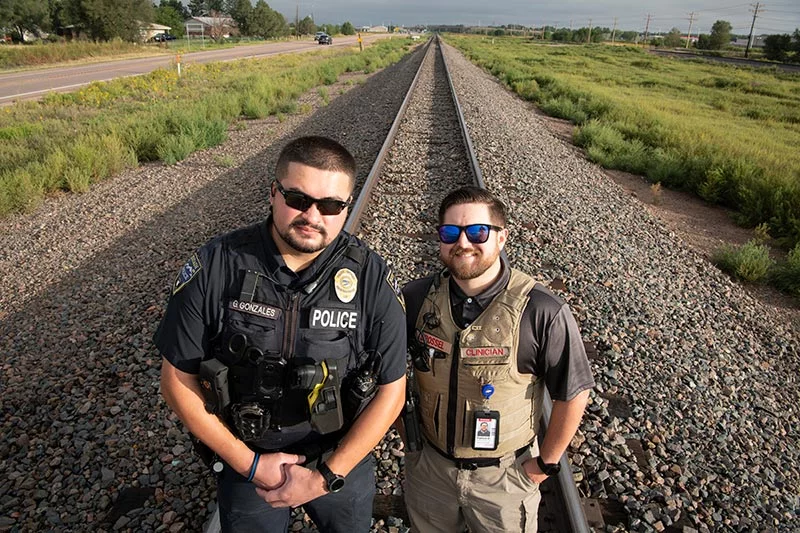
The call from a police dispatcher came at 6:46 a.m.: an intoxicated woman was walking on the railroad tracks in Fountain, Colorado, a town just south of Colorado Springs near the Fort Carson Army post.
Geno Gonzales, a Fountain Police Department officer, and Patrick Drossel, a UCHealth licensed professional counselor, headed to an unmarked police car in the back lot of the station. As Gonzales drove on a busy two-lane highway toward the scene, Drossel read additional notes that flashed on the computer screen sitting between them.
Police had already received calls about this woman overnight. An officer had taken her home a few hours earlier. Now, there were reports that she might be suicidal. It was morning rush hour. Would she run into traffic or stand in front of an approaching train?
Gonzales pulled off the highway behind the car of an El Paso County Sheriff’s deputy, who arrived on the scene first.
Drossel and Gonzales saw the woman talking with the sheriff’s deputy in a field near the railroad tracks. Keeping the woman safe was Drossel’s top priority.
“I’m analyzing the risks involving this individual and figuring out next steps,” Drossel said as traffic streamed by. “I know there are already some concerns.”
He and Gonzales got out of the police car and approached the woman. Drossel introduced himself.
“People are concerned about you,” Drossel told the woman.
He made it clear that he cared about her, too. After a short conversation, the woman handed Drossel her phone. The Colorado Mental Health Line offers free and confidential support. Call, text or live chat 988 any time.
Get 24/7 emotional support
She had called a friend, and Drossel wanted to talk with the man to get a fuller understanding of the woman’s life and why she was out here near the train tracks. The woman told Drossel she’d had two beers and was walking home.
There was no crime here. Instead, this woman was experiencing a mental health crisis. Alcohol was making it worse.
Seamlessly, Drossel took the lead in assisting the woman. He and Gonzales told the deputy that he could leave.
Drossel and Gonzales are part of the Behavioral Health Connect, or BHCON (pronounced “beacon”), unit of the police department, which pairs UCHealth-trained behavioral health providers with law enforcement officers. Together, they help solve a tricky reality of police work: Not all calls require a law enforcement response.
When people are dealing with behavioral health crises, health experts like Drossel provide critical support, de-escalating potentially explosive situations, helping connect people with resources and support and freeing up police officers to handle other calls.
When possible, co-responders provide vital support in the field and prevent costly, time-consuming trips to hospital ERs. Drossel wears a bulletproof vest and carries a police radio, but not a gun. Where Gonzales’ black vest says “POLICE” on the back, Drossel’s brown vest says “CLINICIAN.”
He leads with heart and compassion, carrying hand and foot warmers to hand out on cold days and chilled bottles of water for people who might be thirsty. On that recent early morning call, Drossel determined that he and Gonzales should take the woman to the friend’s house. She was willing to work with Drossel to come up with a safety plan, a key signal that she did not need to be admitted to the ER.
“I need to be here for my kids,” the woman told Drossel.
He walked her to the police car, and she settled into the back seat. From the front, Drossel offered her his business card and told her to call him if she ever needed anything. A UCHealth caseworker would check with her later as well.
“My job isn’t to degrade or berate but to be open and honest to build rapport,” Drossel said later. “I want to help individuals get support.”
On days when Drossel is not working in the field in Fountain with Gonzales, he is based in the behavioral health unit at UCHealth Memorial Hospital Central in Colorado Springs.
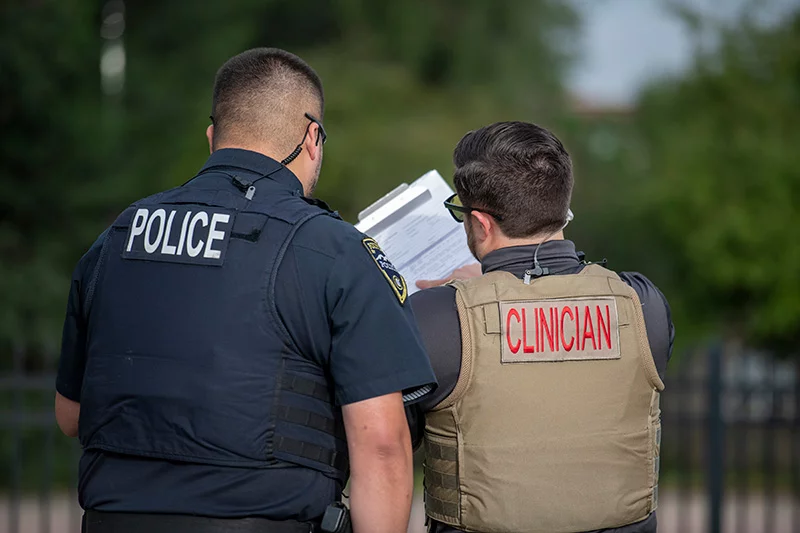
Co-responders bring a behavioral health lens to law enforcement calls
Drossel is one of two UCHealth therapists who work with the Fountain Police Department. UCHealth’s first co-responder program launched in northern Colorado in 2018. The partnerships have expanded to Fountain and other communities and agencies since then, including El Paso County Sheriff’s Office, the Palmer Lake and Manitou Springs police departments, and Aurora. (Read about community paramedics who support underserved people in northern Colorado.)
In Routt County in northwestern Colorado, a mental health response team is now working with the sheriff’s office there. All co-responders have advanced training in crisis intervention and de-escalation techniques.
Gonzales and Drossel have been working together for about a year. Support from behavioral health experts is vital to law enforcement pros, like Gonzales.
“Sometimes I hit a wall in my capacity as a police officer,” he said. “Sometimes it’s hard for us to break away from the law enforcement lens because the way we go about things is different. Our expertise is different. How someone treats me vs. Patrick is different. There are times when people don’t like the police, but they’ll talk to Patrick.”
Gonzales knows Drossel has a good handle on the community resources that someone might need — help finding a job, getting food assistance, securing childcare — and relies on him to share that information with many people they encounter.
Gonzales says that both he and Drossel are passionate about helping people “see the light at the end of the tunnel,” and see their work as rewarding.
After encounters with the duo, many people say how grateful they are. Drossel writes an evaluation about every interaction he has with a person who needs behavioral health support, noting the decisions he made and why. A UCHealth care team then follows up with individuals, based on Drossel’s assessment.
Uncle’s suicide alters life plans for Drossel
Drossel’s path to joining the co-response team began when he was a student at the University of Oregon, where he planned to pursue a career as a pharmacist. Partway through college back in 2013, Drossel received a devastating phone call that changed his life. His father called to tell Drossel that his uncle, Deven Drossel, a Navy veteran and hospital security guard in Maine, had died by suicide.
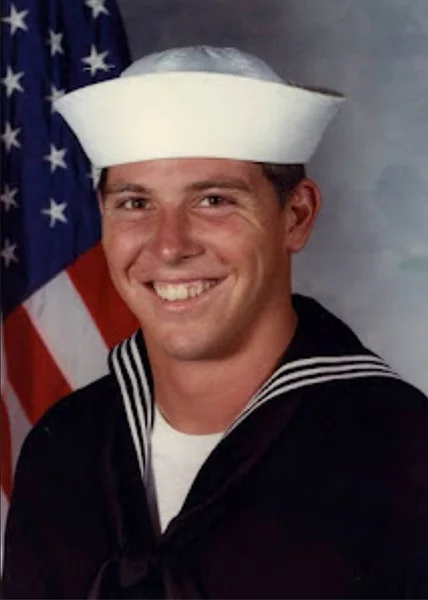
The news shattered Drossel and his family members, but Drossel’s experience with trauma also inspired new goals.
“It changed my perspective in life, what I wanted to do,” Drossel said. “I found my ‘why.’”
In honor of his uncle and in hopes of helping people with mental health issues, Drossel pivoted to major in psychology in college.
He went on to earn his master’s degree in counseling and human services, with an emphasis in clinical mental health counseling, from the University of Colorado Colorado Springs. He had an internship with the Colorado Springs Fire Department CARES, or Community Assistance, Referral & Education Services, program, introducing him to community behavioral health and crisis response.
“That’s where I started to find the love of community behavioral health and working out in the community,” he said.
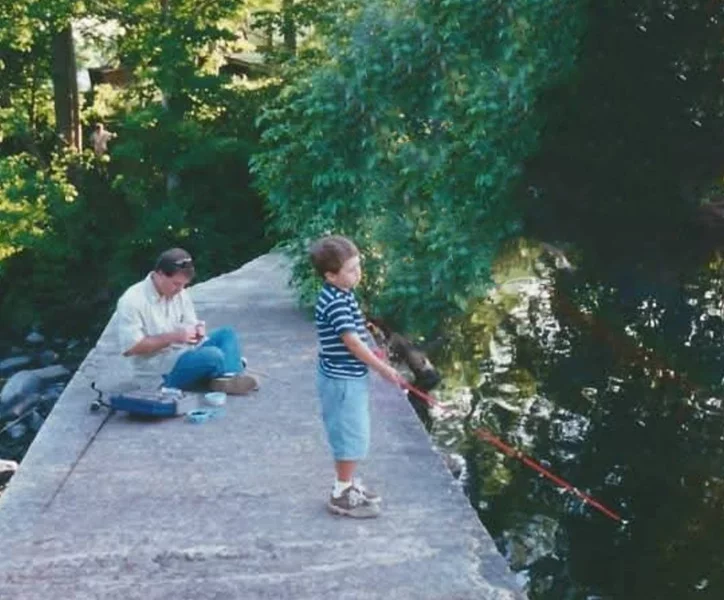
Drossel next worked with Solvista Health in Cañon City, which provides mental health and substance use treatment services. He became a co-response supervisor, helping to build programs in partnership with local police departments.
When he and his wife moved to Colorado Springs, he joined UCHealth and began working with the Fountain Police Department. Along the way, he trained as an Active Bystander for Law Enforcement (ABLE) and is an instructor through CIT International, a nonprofit that focuses on improving community responses to mental health crises.
Drossel now rides alongside Gonzales three days a week on the 6 a.m. to 4 p.m. shift. He brings compassion, clinical expertise, and a deep understanding of what it means to work with people who are experiencing behavioral health crises.
Drossel often quotes from what’s known as the “Crisis Clinician’s Creed,” a set of guiding principles for therapists who do the kind of work he does.
“Crisis clinicians do not stand at the top of a dark hole and reach down to help,” the creed reads. “Rather, they climb into the darkness and provide hope.”
The creed “really resonates with me and the work that I can do in the community,” Drossel said.
His work is a calling, rooted in compassion and optimism, even when the situation is dire.
“Sometimes I joke, saying that I’m the hope fairy. I instill hope in others during their darkest time, guiding them to resilience,” he said.
A desire to serve the community fueled police officer’s mission to help people
Gonzales found his path to policing through a challenging childhood, when three of his friends died by suicide.
“I didn’t have a lot of stability growing up, which makes it easier for people to relate to me,” Gonzales said.
Gonzales said he was wrongly arrested at age 14, but the encounter with law enforcement was positive “because the officer treated me like a human.”
It’s an experience he carries forward into his career with the police. He chose the profession because of his desire to serve the community. Joining the BHCON unit was an easy call, he said.
“I genuinely care about people,” he said.
He keeps one thought front and center when he’s on a call with Drossel with someone having a mental health crisis.
“It’s a reminder that that person means the world to somebody,” he said. “That is somebody’s everything.”
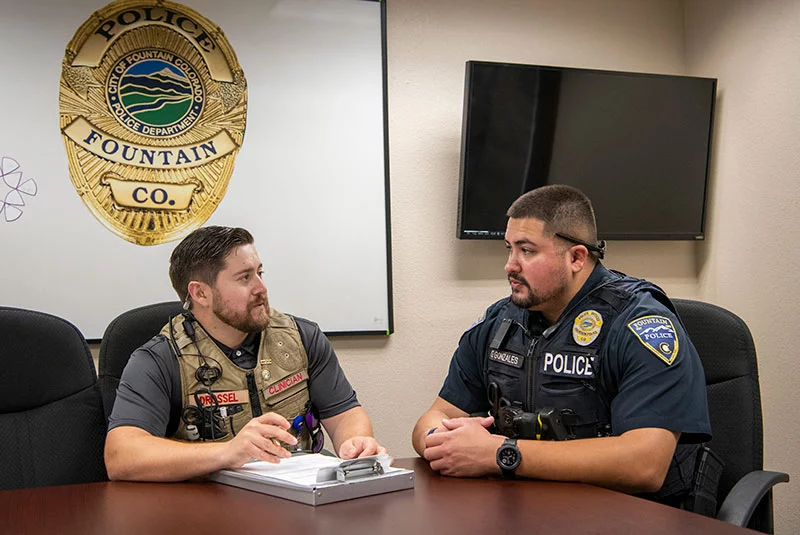
The Fountain Police Department recently recognized Gonzales as officer of the quarter for his work on the BHCON unit.
In Fountain, the BHCON unit has helped more than 120 people so far this year, Police Chief Mark Cristiani said. Of those, only one person was arrested, while nearly 90 worked with the unit on a safety plan or received further evaluation.
“The work the BHCON clinicians are doing has a direct impact,” Cristiani said. “Because of the services they provide, and the follow up they do, when we go out on to a call, it’s not one and done. That’s where the impact is.”
Altogether, throughout southern Colorado this year, UCHealth co-responders have supported nearly 1,400 people during law enforcement calls, said Ken Curtner, southern Colorado UCHealth Behavioral Health manager. Of those, nearly half were able to stay in their home or the community with a safety plan developed by the UCHealth clinician. UCHealth case managers then made more than 5,000 follow-up contacts with those individuals, offering them more than 2,300 referrals to community resources, he said.
“The partnerships we have with our law enforcement partners and the community are making a significant difference in our patients’ lives, in their wellbeing,” he said.
Next call for Drossel and Gonzales eventually leads to hospital ER
Not long after dropping off the woman who had been at the train tracks at her friend’s home in Fountain, Gonzales and Drossel received a call to assist with a “welfare check.” They sped toward an Interstate 25 overpass, where a rookie Fountain police officer was checking on a woman who was slumped over the steering wheel of her car. She had turned the wrong way into oncoming traffic and passed out behind the wheel. The officer removed the keys from the ignition. Gonzales checked for weapons and noted that there were four empty pint bottles of vodka in the car. Drossel hung back until his partner made sure the woman wouldn’t wake up and drive her car toward the police vehicle. Then Drossel walked toward the woman’s car.
He knew immediately that she would need what’s called an “emergency commitment.” The rookie officer asked if Drossel was sure, and Drossel reassured him. The commitment meant that an ambulance would take the woman to the ER at Memorial Hospital Central. Because she was unconscious, it was unsafe for Drossel and Gonzales to take her to the hospital. She would stay at the hospital for a minimum of 72 hours, and after being medically cleared, she would be evaluated by hospital staff and transported to a detox facility.
“She is so intoxicated, she needs medical care,” Drossel explained. “She isn’t conscious.”
He began filling out the paperwork for the emergency commitment, and he and Gonzales followed behind the ambulance as the paramedics brought the woman to the ER.
At the hospital’s ER, Drossel made copies of the paperwork, then headed to the behavioral health department to take care of other details and pass on clinical information about the woman. By taking the lead on this case and myriad other tasks, Drossel frees up Gonzales to focus on the law enforcement aspects of his job.
Drossel described other types of cases he’s worked on with Gonzales in the past year. There was the woman who called the police department 60 times in one week, including for help with her fitness tracker. Drossel said he worked with the woman to help her develop better coping skills, and the calls stopped.
There was the time he hiked through the woods to find someone who had been in a car wreck.
And, recently, a distraught man threatened to jump off a bridge in Fountain. The man had told his partner that he planned to end his life after finishing his cigarette. Gonzales and Drossel pulled up to the bridge as the man was taking a last drag. Drossel approached him calmly, introduced himself as a therapist and asked why he was considering suicide. Drossel ultimately persuaded him to seek treatment.
The work, Drossel said, is varied and profoundly meaningful.
“It shows that UCHealth is here for the community, more than ‘hey, we’re a hospital,’’’ he said. “UCHealth and the city of Fountain have identified this need in our communities, and I am grateful we have these programs supporting patients and continuing to put patients first.”
For Drossel, kindness and compassion run deep and, in many ways, keep him connected to his uncle. He remembers that life-changing phone call back in 2013 and his own journey of grief. He and his uncle shared a love of baseball, so in honor of his uncle, Drossel attended every home baseball game at his college that year, and the next.
On the anniversary of his uncle’s death each year, Drossel does something that helps him remember him. Usually, he goes fishing.
And when he and Gonzales help someone in crisis in Fountain, Drossel often pauses to reflect on the impact his uncle’s life and legacy are having to this day.
“When I have the wins with co-response, I think, ‘I helped someone, and I did what I was supposed to do.’
“I know I couldn’t do anything to help him, but I know that I can help others.”
